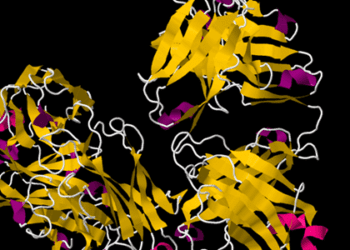Rixtuximab superior to azathioprine in autoimmune vasculitis
1. Rituximab was more effective at maintenance of remission at 28 months as compared to azathioprine for patients with antineutrophil cytoplasm antibody (ANCA)-positive vasculitides.
2. There were no statistical differences in adverse events between the two groups.
Evidence Rating Level: 1 (Excellent)
Study Rundown: Granulomatosis with polyangitis, microscopic polyangitis, and renal-limited antineutrophil cytoplasm antibody (ANCA)-associated vasculitis are all autoimmune conditions that can lead to multi-organ failure. While the pathogenesis and etiology of these conditions are still being examined, the current principles of management include immune-suppressing medications for disease-remission induction followed by maintenance of remission. Rituximab is an anti-CD20 biologic that targets B-cells and has been used successfully for maintenance of remission in other autoimmune conditions such as rheumatoid arthritis.
This non-blinded, randomized controlled trial compared two different regimens for maintenance of remission in ANCA-positive vasculitides. At 28 months, 28% of patients randomized to azathioprine experienced relapsing disease versus only 5% of those treated with rituximab. Adverse events such as severe infection were similar in both groups.
Limitations include that the study was non-blinded and that baseline renal function (at disease flare) between the two groups was not well-matched which impacts prognosis. Furthermore, all patients in this trial were also taking glucocorticoids as titrated at the discretion of various investigators. However, the results of this study are quite remarkable and raise the point of trying various new biologic agents for maintenance of remission. Future studies will likely focus on the long-term efficacy and safety of using rituximab as maintenance treatment in the various vasculitides.
Click to read the study in NEJM
Click to read an accompanying editorial in NEJM
Relevant Reading: Rituximab versus cyclophosphamide for ANCA-associated vasculitis
In-Depth [randomized controlled trial]: 118 patients with newly diagnosed or relapsing ANCA-positive vasculitis were randomized 1:1 to maintenance treatment with either azathioprine and prednisone or rituximab and prednisone. All patients underwent induction of remission with glucocorticoids and pulse cyclophosphamide. Baseline characteristics between the two groups were well-matched except for renal function at disease flare (p=0.06) and at inclusion (p=0.08). Disease relapse at 28 months post-induction as defined by the Birmingham Vasculitis Score was observed in 29% of those receiving azathioprine versus 5% of those receiving rituximab (p=0.002, NNT = 4). Severe adverse events were similar in both groups, most notably severe infections (14% in azathioprine group versus 19% in rituximab group).
More from this author: Brodalumab effective in treating active psoriatic arthritis, Idelalisib plus rituximab improves progression-free survival in relapsed CLL, SSRI use during pregnancy not linked to increased risk of autism, Combo antifungal therapy most effective treatment for cryptococcal meningitis
Image: PD
©2012-2014 2minutemedicine.com. All rights reserved. No works may be reproduced without expressed written consent from 2minutemedicine.com. Disclaimer: We present factual information directly from peer reviewed medical journals. No post should be construed as medical advice and is not intended as such by the authors, editors, staff or by 2minutemedicine.com. PLEASE SEE A HEALTHCARE PROVIDER IN YOUR AREA IF YOU SEEK MEDICAL ADVICE OF ANY SORT.






